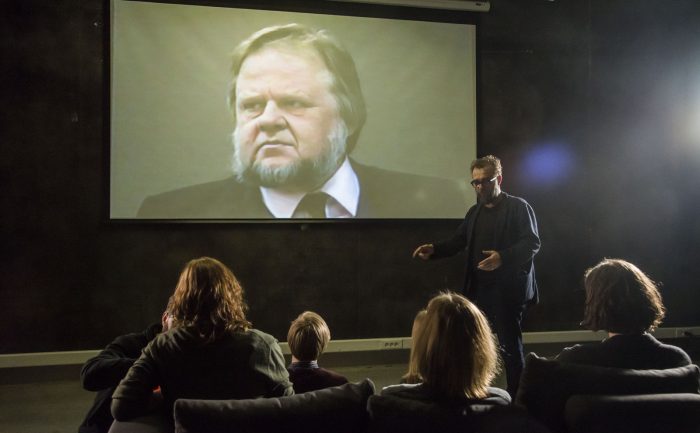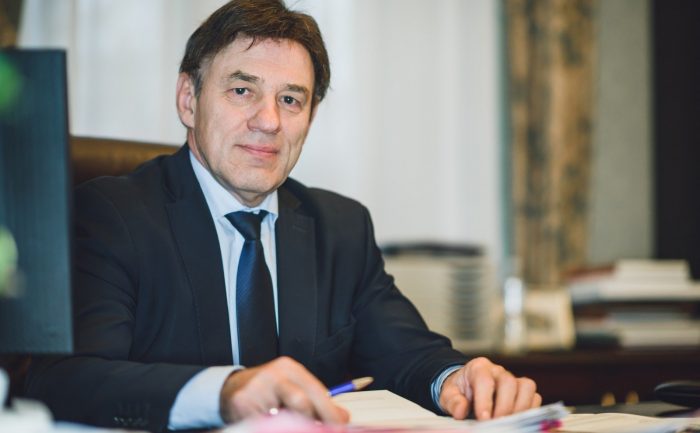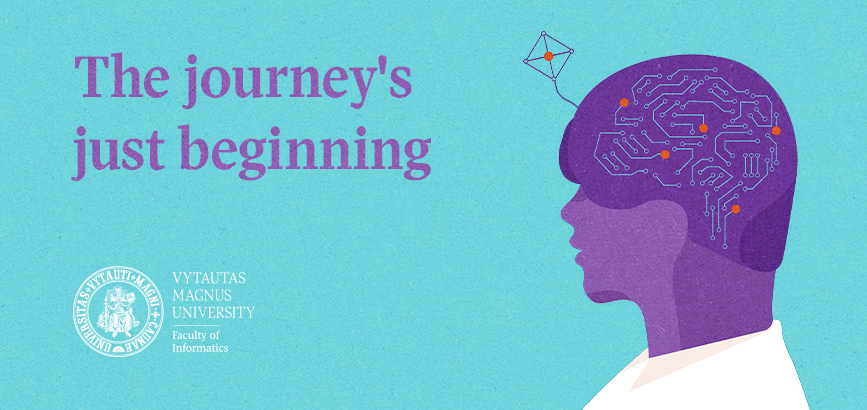Employment Guide for International Students in Lithuania
Vytautas Magnus University is sharing information relevant to all international students who are interested in employment opportunities in Lithuania.
For EU citizens, the process of employment in Lithuania is quite simple, while those arriving from non-EU countries must go through certain procedures.
Non-EU students who are willing to work during their studies in Lithuania must obtain a Temporary Residence Permit, which will then allow them to work up to 20 hours per week during their studies. No additional work permits are required. PhD students can work full-time.
After graduation, non-EU students can apply for a Temporary Residence Permit, which would provide them with additional 12 months for job searching and self-employment purposes. During these 12 additional months no additional work permit is required from the recent graduates.
Later, if employment in Lithuania continues, the graduate should apply in time for the renewal of his/her Temporary Residence Permit on the grounds of an employment contract and obtain a work permit from the territorial Employment Services office. Both an employer or a graduate himself can apply for a work permit. More information is available in the territorial Employment Services office.
More information related to legal stay in Lithuania, social guarantees, health care, work, and employment is provided in the Migration Information Centre (MIC) “I Choose Lithuania”. Here you also can get a consultation in Lithuanian, English or German languages, free of charge. More information available on the website of “I Choose Lithuania”.
More information:
VMU Career Centre (Student Affairs Department)
Address: S. Daukanto str. 27, room 301, LT-44249 Kaunas
E-mail: career@vdu.lt
Phone: +370 37 327 983
Website: http://karjera.vdu.lt/en/
Students are invited to reserve place of residence in the dormitories
Starting from January 17th, 2020, all international students enrolled to study or already studying at Vytautas Magnus University (VMU), as well as non-VMU students, may reserve themselves places of residence in the dormitories of VMU.
Number of free places for residence in the dormitory is limited but the vacant room list is constantly updated, therefore it is recommended to check it regularly.
For prospective students of VMU and non-VMU students
Incoming students of VMU full-time Erasmus+, Bilateral or other exchange studies and students form other higher education institutions, who want to reserve a place of residence in one of the dormitories of VMU must follow this procedure:
- create a personal account to the online accommodation system http://accommodation.vdu.lt („Accommodation for Others“)
- reserve place of residence from the provided list of vacant rooms
- pay (80 EUR) prior fee for reservation no later than in 3 working days after making the reservation
- receive confirmation e-mail of your reservation
- sign your online Agreement for Accommodation
- move-in into the dormitory no later than by February 16th, however, accommodation fee will be started to be count starting from the 3rd working day after sending confirmation e-mail.
For current VMU students
VMU students, who want to reserve a place of residence in one of the dormitories of VMU must follow this procedure:
- login to the online accommodation system http://accommodation.vdu.lt („VMU Students Accommodation“)
- reserve place of residence from the provided list of vacant rooms
VMU payment system is changing
We want to inform that from December 2nd, 2019, VMU payment procedures are changing. Starting from the indicated date, procedures will be following:
If student is paying the fees personally:
After selecting preferred amount and creating yourself an invoice in the section „Fees“ of the Student Portal http://studentas.vdu.lt , you will be automatically redirected to the „Paysera“ payment gateway, where you will be allowed to choose a preferred bank or payment by international debit/credit card. After your return to the http://studentas.vdu.lt or after re-logging to the Portal, information of your payment will be instantly updated in the Student Portal http://studentas.vdu.lt. Students of Vytautas Magnus university will also be informed about successful payment by an e-mail message sent to the mailbox provided by VMU, other persons (student of other higher education institutions) will receive this message to personal mailbox, known to VMU.
If another person is paying for the student (e.g. father, mother, friend, etc.):
After selecting preferred amount and creating yourself an invoice in the section „Fees“ of the Student Portal http://studentas.vdu.lt , you will be automatically redirected to the „Paysera“ payment gateway, where you will have to choose one of the payment options in the section “Other payment systems”. Created form of the payment should be printed or saved and send to the person, who will pay your fees. Information of your payment will be updated in the Student Portal http://studentas.vdu.lt in no more than 1 working day after completing the payment. Students of Vytautas Magnus university will be informed about successful payment by an e-mail message sent to the mailbox provided by VMU, other persons (student of other higher education institutions) will receive this message to personal mailbox, known to VMU.
If legal person (e.g. company, enterprise, etc.) is paying for the student:
Before paying you shall contact responsible officer of VMU Finance Department by an email vilma.aleksandraviciene@vdu.lt.
IMPORTANT:
- You shall pay only the amount of fees, which you have selected in the section “Fees” and which is also indicated in your invoice:
- You are allowed to adjust to a smaller amount of fees than University has allocated;
- You are not allowed to adjust to a bigger amount of fees (you cannot pay in advance);
- In order to complete your payment, you have to have enough money in your bank or card account, otherwise payment will be denied.
New accommodation website
In order to facilitate the dissemination and search of information on Vytautas Magnus University (VMU) dormitories, there is created a new platform – https://accommodation.vdu.lt. From now on, the most important and topical news related to VMU dormitories, meetings, changes initiated by the self-government, payment, etc. will be placed here.
You are welcome to follow the news, and if you have any questions please contact us
VMU to Host 11th Conference of Lithuanian Neuroscience Association
On Friday 29 November, from 9 a.m., the 11th international conference of the Lithuanian Neuroscience Association will be held at VMU Small Hall (28 S. Daukanto g., Kaunas). The theme of the conference is Behavioural Medicine and Neuroplasticity. Paper abstracts are to be submitted before 1 November using an online form.
Preliminary program of the conference includes presentations on behavioural medicine, psychology, brain neuroplasticity, neuroinformatics and neurotechnologies by neuroscientists from the Czech Republic, the United Kingdom, Switzerland, Sweden, Serbia, Saudi Arabia, and Lithuania. Conference participants will have an opportunity to take part in the Virtual Reality Tour into the Human Brain, which has been brought by scientists from Saudi Arabia.
The conference is organised by Lithuanian Neuroscience Association, Lithuanian University of Health Sciences, and Vytautas Magnus University.
VMU to Celebrate 30th Reestablishment Anniversary
In the spring of 1989, thanks to the efforts of scholars in Lithuania and abroad, Vytautas Magnus University was re-opened: the first independent higher education school in what was still Soviet-occupied Lithuania. On Wednesday 24 April, 4 p.m., VMU will celebrate the 30th anniversary of its re-establishment: the festivities will be held at the VMU Great Hall (S. Daukanto g. 28).

The celebration programme will include the premiere of documentary film ‘A Free-Thinking University’ directed by VMU Assoc. Prof. Rytis Zemkauskas and a discussion entitled “Challenging the Established Practices”.
The new film will not have a conventional historical narrative. It focuses on individual perspectives and actions taken in order to shape the modern identity of the Republic of Lithuania. It is the story of a university which has most faithfully mirrored the dreams of the reborn Lithuanian state. 30 years of VMU – 30 years of Lithuania and its successes and setbacks.
In the era of Sąjūdis (initially, the Reform Movement of Lithuania) soon before and after the collapse of the USSR, Lithuanian and emigrant scientists were united by a common goal: to revive and modernize the University of Lithuania in Kaunas, which was founded in 1922, later renamed after Grand Duke Vytautas the Great, and eventually closed down by the Soviets in 1950. The united community sought to build a university which would eradicate the Soviet mentality, institutional culture, and hierarchy-based management from higher education, while simultaneously paving the way for a more accelerated development of a Western academic culture.
The work on re-establishment began on 26-28 April 1989 in Kaunas, during the international scientific conference The National Concept of a Higher Education School and the University of Kaunas. The event concluded with the declaration of the Act of Re-establishment of VMU: this was the first step taken by the Lithuanian and emigrant scientists, which subsequently led to their further cooperation in the university’s development.
Later, in December 1990, the VMU Statute was adopted, which formally established not just the university’s autonomy, academic freedom, and integrity of science and studies, but also the three levels of studies (BA, MA, PhD), which was unprecedented in Lithuania at the time. Ever since the first days of its rebirth, VMU has given special attention to the teaching of foreign languages. These traditions have been going strong to this day.
VMU Rector Prof. Juozas Augutis is certain that the history of the university is inseparable from the history of the country and its people: over the course of three decades, VMU has become a symbol of Lithuania’s intellectual and cultural life.
“I think that the conditions of academic life available at the university could be transferred to the public or political life. A university is not just a space of education: thanks to the values upheld while organising the community life here, we also attract organisations and people from the outside. I believe that something that truly has value can only be created with free will and great enthusiasm. It is not always just knowledge and logic that lead us to the truth. We should not forget to follow our values and an open-hearted understanding of experience”, the Rector said.
VMU became the first higher education school in the Baltic region to organize studies based on the principles of liberal arts: the ideas that support personal freedom of students and foster the responsibility of creating one’s own individual study schedule, working on creative projects, and promoting critical thought.
On the eve of the 30th re-establishment anniversary, Vytautas Magnus University has a recently expanded community: in 2019, it has been joined by the Lithuanian University of Educational Sciences (LUES) and Aleksandras Stulginskis University (ASU), which became the VMU academies of Education and Agriculture, respectively.
The celebration of Vytautas Magnus University’s 30th re-establishment anniversary will take place on Wednesday 24 April, 4 p.m., at VMU Great Hall (S. Daukanto g. 28, Kaunas). The event will start with the premiere of documentary film ‘A Free-Thinking University’ and the discussion “Challenging the Established Practices”.
On Friday 26 April, 2 p.m., a festive meeting of VMU Senate will be held at the Aula Magna (Gimnazijos g. 7).
Prof. Ričardas Krikštolaitis Attended Energy Conference in Brussels
On 5-6 November, Prof. Ričardas Krikštolaitis, the head of VMU Dept. of Mathematics and Statistics, attended the international conference Central European Day of Energy 2018 (CEDE) organized in Brussels, the headquarters of the European Commission. The event was organized by Central Europe Energy Partners (CEEP) in cooperation with the DG Energy of the European Commission and partners, including Vytautas Magnus University.
The main aim of CEDE was to consolidate a regional energy platform that reflects the region’s perspective on the development of the European energy policy and highlight the accomplishments and challenges faced by regional stakeholders in the implementation process. 143 participants attended the conference: stakeholders from European institutions, national administrations, energy and energy intensive companies, academics, experts and journalists.
The conference revealed that Central Europe has managed to achieve meaningful results in international cooperation in the field of energy. The main reason for the success is the increasing infrastructural interaction and integration of markets. Furthermore, a lot of progress has been made in the synchronisation of the Baltic states with the Continental European Network. Also, as a result of liberalization processes and the legal system, international trade has been growing dynamically as well.
Speakers at the conference included the Vice President of the European Commission for the Energy Union Maroš Šefčovič, Member of the European Parliament, Chair of ITRE Committee Jerzy Buzek, representatives of Litgrid, ENTSO-E, Transelectrica, EU Stream, ROMGAZ and other companies and organizations from Poland, Romania, Slovakia, Hungary and other countries. The event was divided into three parts dedicated to energy in the Central Europe and the sectors of electricity and gas.
VMU is a partner of the conference organizers, the Central Europe Energy Partners.
More information
VMU to Host Annual UNESCO Media and Information Literacy Conference
For the first time in the Baltic States and the Northern Europe, the Feature Conference of Global Media and Information Literacy Week will be held at Vytautas Magnus University (VMU) in Kaunas, Lithuania on 24-25 October. The event, the 8th Media and Information Literacy and Intercultural Dialogue (MILID) Conference, will welcome about 300 participants from all over the world, including leading experts from the USA, France, Great Britain, and other countries.
Conference speakers will discuss the changing media environment, the influence of the media on social and political processes, and the competences and skills necessary for sustainable social, cultural, economic and political development of the world. The aim of the event is to promote international cooperation in the development of media and information literacy (MIL), support the role of academic institutions and their relations with other organizations, establish new partnerships, and stimulate discussions on these issues in the public sphere for the advancement of a smart, creative, and sustainable civil society.
“Over the last 40 years, which have been very dynamic in the context of the media, communications, and social change, UNESCO was one of the first international organizations to take on leadership in the development and promotion of international dialogue on MIL issues. From the Grunwald Declaration of 1982 to the Riga Recommendations of 2016, UNESCO has been inviting countries, organizations, creative industries, educational, scientific and cultural institutions to unite and cooperate in MIL networks and implement projects and initiatives”, one of the conference organizers, head of VMU Dept. of Public Communication, Prof. Kristina Juraitė, explained.
The conference is organized by UNESCO, Vytautas Magnus University, University of Latvia, and the national commissions for UNESCO in Latvia and Lithuania. Both VMU and University of Latvia are members of the UNESCO Media and Information Literacy and Intercultural Dialogue (MILID) Network. The guest speakers at the event will include Prof. Sonia Livingstone from London School of Economics and Political Science (UK), Dr. Carl Heath (Sweden), Prof. Paul Mihailidis (USA), Prof. Divina Frau-Meigs (France) etc.
The theme of the conference, and of the entire Global MIL Week 2018, is Media and Information Literate Cities: Voices, Powers, and Change Makers. Discussions and paper presentations will focus on education of media and information literacy in the Baltic states, MIL as mediator between cultural industries and the city, the transformation of information needs in the cities, privacy and bullying online, the impact of digital environments in the age of misinformation, the role of MIL in the struggle for gender equality and women’s empowerment, the fight against hate and intolerance etc.
“The academic community has been given the rather important role at the forefront of the media and information literacy movement, which promotes the need for MIL in a sustainable, civil and democratic society. For this reason, this annual conference is primarily an opportunity for Lithuanian scientists to join international media literacy networks, get acquainted with the latest scientific studies and develop relevant research in the future”, Prof. Juraitė said.
Three years ago, the professor and other VMU scientists conducted a study on media literacy in Lithuania. The study, titled “Education of News Literacy: How to Understand Media?”, involved two public surveys where questions were answered by 15-17 year old pupils and adults (from 18 years old) respectively. The results demonstrated that the more educated individuals tend to assess online content more critically and verify the veracity of the news. The experts also prepared guidelines for the Lithuanian media policy: they proposed to review the methods of promoting and sponsoring journalism, with more focus on public interest, and to reassess the teaching of media literacy at schools.
This year VMU has strengthened its relations with the United Nations Educational, Scientific and Cultural Organization: the university has opened the UNESCO Dept. of Media and Information Literacy, which conducts MIL research: analyses media consumption, media policy, citizen participation and empowerment trends, and MIL education initiatives. The department also aims to develop MIL competences of students and educators and disseminate information on these issues in Lithuania and internationally.
“This acknowledgement is a result of long cooperation with UNESCO and other international organizations in the field of MIL research and studies. In their development of media research, VMU scientists have been actively involved in UNESCO-initiated MILID and GAPMIL networks and the activities of international scientific associations ECREA, ICA, BAMR, and AABS”, the head of VMU Dept. of Public Communication explained.
According to Prof. Juraitė, the UNESCO conference should be of particular interest to scholars of a wide variety of fields, including communication, journalism, education science, sociology, politics, public administration, arts, creative industries and other areas, as well as education and media policymakers, NGOs, businesses and start-ups.
The 8th annual UNESCO Media and Information Literacy and Intercultural Dialogue (MILID) Conference will be held on 24-25 October in Kaunas, at VMU Great Hall (S. Daukanto g. 28) and VMU Centre for Research and Studies (V. Putvinskio g. 23). On 26 October, the participants will attend further events in Riga organized by the University of Latvia.
Rector Congratulates VMU on New Academic Year

Vytautas Magnus University’s Rector Prof. Juozas Augutis congratulates the university community, the students and the employees, with the beginning of the new academic year.
Dear community,
The recent period has been filled with tension and changes for the university and its people. However, one tradition never changes: the celebration of the new academic year.
September 1st is an occasion to distance ourselves from daily professional worries and to immerse joyfully into the festivities whose main participants, students and lecturers, mark the day of knowledge and science. Knowledge and science are what unites the academic community, the university, and us.
I invite everyone to be optimistic, trust yourselves, attend the celebration together with VMU colleagues and students, and share not only the knowledge of science but also the positive spirit all through the year.
Let’s begin together, on September 1st.
Rector
Apply Now: Baltic Summer University
This summer Vytautas Magnus University is hosting the Baltic Summer University (BSU): a variety of courses to boost professional skills, learn some Lithuanian and other languages, experience different cultures and meet new people. Registration is still open to all courses except in natural sciences and the Summer Internship Programme.
Baltic Summer University at VMU, which opens in July, will offer a variety of summer courses depending on the students’ interests and needs: up-and-coming musicians will be taught by award winning masters and will perform at the closing ceremony of BSU; those willing to understand why the Baltics are the best summer destination and learn about their culture, art, society, politics and economy should choose the Summer School for Baltic Studies. This year, BSU will have guest lecturers from Latvia and Estonia. Next year it will expand its activities to other Baltic countries and move around them for a more immersive experience.
“Vytautas Magnus University has almost 20 years of experience working in the field of Baltic Studies, sharing its experience in world-renowned networks and collaboration projects, as well as attracting people to learn about Lithuanian language and culture at the University’s oldest summer school. Being confident about our excellence in the field of Baltic Studies, we have come up with the idea to convene professionals from other disciplines to Baltic Summer University and its specialized predecessor, Summer School of Natural Sciences”, the VMU Vice-Rector for International Relations Prof. Ineta Dabašinskienė explained.












